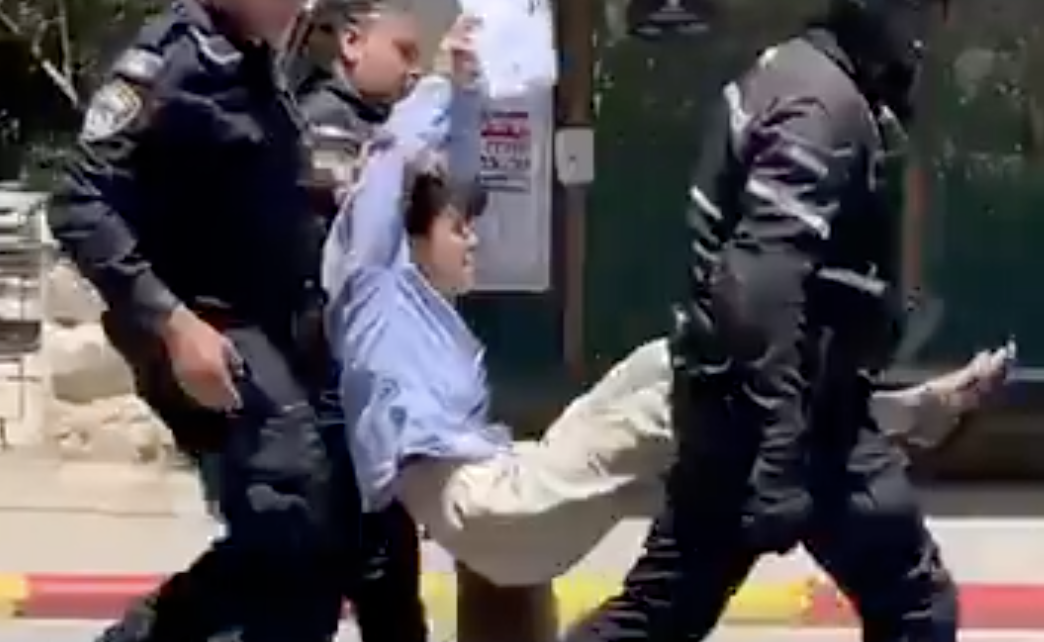



Police in Jerusalem on Sunday arrested two women — one a protester, the other a bystander who argued with an officer over the protester’s arrest — and subjected them each to a strip-search, before releasing them after some four hours, Haaretz reported.
The two women, Dr. Renana Keydar and Shoshan Dolgopolsky Geva, were arrested outside the home of Economy Minister Nir Barkat, whose Jerusalem residence has been the site of nightly group-singing protests calling for the release of the hostages held by terror groups in Gaza.
Geva was participating in the protest. Keydar, who lives near the protest site, came to check on her daughter, who was participating.
Keydar, a humanities professor at the Hebrew University in Jerusalem, was not participating in the protest herself, she told Channel 12.
The police threatened to call social services on the women because their children were participating in the protest, which comprised a total of four adults and four children, Keydar said.
The protest was held near a bomb shelter, in accordance with the military’s safety guidelines amid the ongoing war with Iran, she added.
The two women were released, without conditions, some four hours after their initial arrest.
The Hebrew University, in a statement, condemned the arrest of its lecturer, calling it “violent and illegal.”
“We must not accept a situation whereby, under the cover of war, the Israel Police violates basic civil rights, such as the freedom to demonstrate, and silences those who seek to raise their voices for the sake of returning the hostages. This harms the democratic foundations of the State of Israel, and we must not be silent about it,” the university said.
A similar incident occurred last week, when a woman who was demonstrating in front of the prime minister’s residence was arrested and made to undergo a strip search in custody.
In a statement Sunday, the police said: “Earlier today, in a demonstration in front of the home of an elected official, a number of people came to the location, made noise, lay on the ground and didn’t heed the instructions of the police to move to the place where they were permitted to demonstrate.
“Because they did not heed the officers’ instructions, two women were arrested for questioning, after which they were released. As part of the questioning and under the authority granted by law, a search was carried out on the detainees.”
Also Sunday, a civilian security squad led by far-right rapper Yoav Eliasi — known by his stage name “The Shadow” — detained a group of foreign journalists at a missile impact site in Tel Aviv.
Footage showed the volunteers, operating under the auspices of the Israel Police, separating Israeli journalists from foreign ones in a stairwell and allowing the former group to proceed to the scene of an Iranian ballistic missile impact. Several foreign reporters were then detained, Haaretz reported.
Photojournalist Oren Ziv told the outlet that reporters had been on the roof of the building when a police officer told them to come down.
“On the way [down], the civilian security squad stopped us and asked where Al Jazeera was… They told Israeli photographers to pass through, and foreigners to wait. They mainly took the IDs of Arab photographers,” he said.
Upon arriving at the impact site, Tel Aviv District spokesman Shahar Gamzo immediately released the journalists.
After an appeal by the journalists’ union to the Tel Aviv District Police regarding the incident, police decided its civilian security squads would not interact with reporters at “various sites,” the union said.
National Security Minister Itamar Ben Gvir has pledged to crack down on foreign media broadcasting the locations of missile impacts, calling it a “danger to state security.”
Responding to the incident, Ben Gvir hailed Eliasi, a staunch supporter of the far-right minister, as a hero.
“The Shadow, whom you all are disparaging, is a hero,” he wrote in an X post, lauding the civilian security team. “Instead of shaming, send them flowers — they are our shield.”
He continued, “The Al Jazeera channel and spies disguised as journalists — will not broadcast here. Period. That’s the policy. Get used to it.”
Last week, police halted the broadcast of several foreign outlets, saying their footage — which revealed “precise locations” — was being used by Al Jazeera, a Qatar-funded network banned in Israel since last summer.
